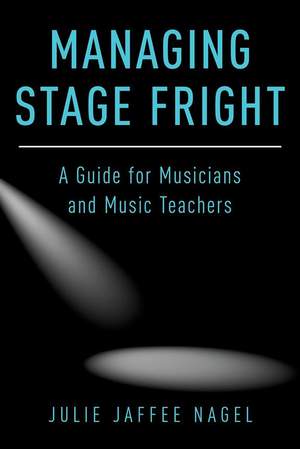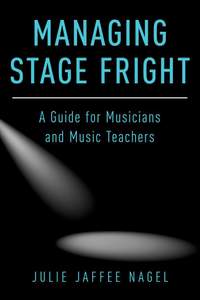Book
$31.75Special import
Contents
- Figures
- Preface
- Acknowledgments
- CHAPTER 1 - STAGE FRIGHT: WHAT IS IT?
- Questions for Thought
- Some General Considerations About Stage Fright
- A Personal Reflection
- Music Teachers as Mental Health Resources
- Paradoxical Questions and Further Thoughts About Stage Fright
- Yerkes-Dodson Law (Arc of Anxiety)
- Mental Preparation: Attitudes and Aptitudes
- Talking and Listening to Students: Validating Feelings
- Implications for Music Teachers
- CHAPTER 2 - DELVING DEEPER INTO STAGE FRIGHT
- Questions for Thought
- Stage Fright: A Mind/Body Duet
- Symptoms of Performance Anxiety
- Discussing Performance Anxiety In Studio Class
- Identifying Performance Anxiety Symptoms
- Symptoms Chart
- Two Activities
- 1-Mood Ring
- 2-Chill Out: Tools for Cool Students
- Implications for Music Teachers
- CHAPTER 3 - THE A B Cs OF STAGE FRIGHT
- Questions for Thought
- An A B C Model of Anxiety
- Recap: A B C Model
- Vignette: John
- Actions for Teachers and Students
- Activity 1-Identifying Letter B Responses
- Activity 2-Letter B Cards (Supportive Self-Statements)
- Examples of Supportive Self-Statements
- Implications for Teachers
- CHAPTER 4 - SYMPTOMS VS. MANAGEMENT
- Questions for Thought
- Symptoms as Cues and Clues
- Vignette: Cindy
- Assessing Thoughts and Feelings
- Talking About Stressors
- Implications for Teachers
- CHAPTER 5 - CONFLICT - A PARADOX
- Questions for Thought
- Paradox: Identifying Emotional Conflicts
- Recognizing Conflicts
- Dealing with Memory Slips and Technique Meltdowns
- Jam Plan
- Some Childhood Antecedents of Stage Fright
- Additional Examples of Conflict
- Vignette: Robert
- Young Children (and Adults) Fill the Gaps
- Additional Considerations About Conflict
- Conflict Chart
- Symptoms Chart
- Implications for Teachers
- CHAPTER 6 - THE EMOTIONAL FUEL BEHIND STAGE FRIGHT
- Questions for Thought
- Psychodynamic Model
- Why Consider Psychodynamic Models of the Mind?
- Mental Ghosts Haunting the Teaching Studio
- The Mind Does Not Forget: the Unconscious
- A Visual Model of the Unconscious
- Figure 1 - Conceptual Diagram of the Unconscious
- Revisiting Cindy
- Transference
- Shame
- Countertransference
- Multiple Function
- Vignette: Joe
- Psychological and Practical Tips
- Imagine This.....
- Implications for Teachers
- CHAPTER 7 - DEFENDING AGAINST ANXIETY
- Questions for Thought
- Performance as a Danger Situation: Ego Defenses
- The Ego and Its Defenses Against Anxiety
- Table 1 - Typical Ego Defenses
- Vignette: Mary
- Table 2:Performance Anxiety Symptoms as Ego Defenses
- (Letter B)
- A B C Model of Anxiety
- Activity 1 - Recognizing Anxiety
- Activity 2 - Relabeling Anxiety
- Vignette: Cindy's Cold Hands as Ego Defenses
- Shame Masquerading as Resistance to Performance Anxiety
- Shame on You!
- A Fusion of Musical and Personal Identity
- Helping Students Discover Their Ego Defenses
- Implications for Teachers
- CHAPTER 8 - LEARNING THEORY AND BEHAVIOR MODIFICATION
- Questions for Thought
- Learning Theories as Guidelines for Teachers
- Classical Conditioning
- Operant Conditioning
- Implications for Teachers
- CHAPTER 9 - COGNITIVE BEHVIOR THERAPY, RATIONAL EMOTIVE THERAPY, AND LETTER B
- Questions for Teachers
- What Is Cognitive Behavior Therapy (CBT)?
- An Example of Cognitive Relabeling Stage Fright Responses
- Two Activities With A B C Model
- Activity 1 - A B C Recognizing Anxiety Responses
- Activity 2 - Rethinking and Relabeling Anxiety Responses
- Neuropsychology and Brain Imagining
- Beta Blockers and Performance Anxiety
- Evidence-Based Claims for Reducing Performance Anxiety
- Implications for Teachers
- CHAPTER 10 - PERFORMANCE ANXIETY BEGINS IN THE NURSERY
- Questions for Thought
- Teachers As New Parents: Developmental Issues
- Human Development and Performance Anxiety
- Elaboration of Erikson's Eight Stages in the Life Cycle
- Stage One: Trust vs. Mistrust
- Implications for Teachers
- Stage Two: Autonomy vs. Shame and Doubt
- Implications for Teachers
- Stage Three: Initiative vs. Guilt and
- Stage Four: Industry vs. Inferiority
- Anxiety Alerts for Teachers!!!!!
- Young Children
- Middle School-Aged Children
- Implications for Teachers
- Stage Five: Identity vs. Identity Confusion
- Anxiety Alerts for Teachers!!!!
- Adolescents
- Implications for Teachers
- Stage Six: Intimacy vs. Isolation
- Implications for Teachers
- Stage Seven: Generativity vs. Stagnation
- Implications for Teachers
- Stage Eight: Integrity vs. Despair
- Implications for Teachers
- Recap: Developmental Stages and Stage Fright
- Additional Implications for Teachers
- CHAPTER 11 - A VIRTUAL RECITAL: A SYNTHESIS
- Questions for Thought
- Susan: How to Understand and Handle Performance Anxiety
- Concepts for the Teacher to Convey to Susan, The Recitalist
- Plan for Teacher
- Format of Virtual Recital
- The Recital
- Implications for Teacher and Recitalist
- CHAPTER 12 - RECAPITULATION AND FINALE
- Questions for Thought
- Putting it All Together
- Performance Anxiety is More Than Symptoms
- Stigmas, Caution, and Optimism
- Tuning In To Students and Tune Ups for Teachers
- Interdisciplinary Collaboration
- Criteria for Making A Referral for Professional Help
- Music School Curriculum
- Coda: Summary of Implications for Recognizing and Teaching Anxiety Reduction
- Uniqueness of Music Teacher's Role
- CHAPTER 13 - DA CAPO: BACK TO THE BEGINNING
- GLOSSARY OF PSYCHOLOGICAL TERMS USED IN THE TEXT
- ILLUSTRATIVE READINGS ON PERFORMANCE ANXIETY
- INDEX




